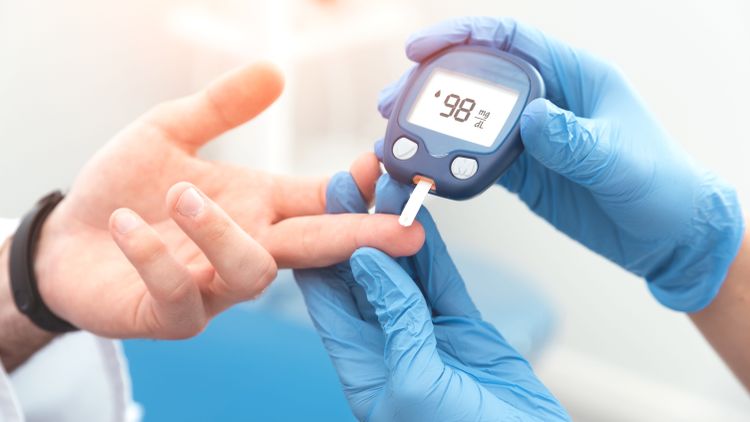
Everything You Need To Know About Diabetes Nephropathy
By Dr. Saket Kant in Endocrinology & Diabetes
Feb 06 , 2024 | 8 min read
Your Clap has been added.
Thanks for your consideration
Share
Share Link has been copied to the clipboard.
Here is the link https://www.maxhealthcare.in/blogs/diabetes-nephropathy-kidney-disease
What is Diabetes Nephropathy?
Kidneys are composed of over a million nephrons, which are pivotal in filtering blood and also play a crucial role in regulating the body's fluid and electrolyte balance. Diabetes-related nephropathy, also known as diabetic kidney disease (DKD), is a condition that impairs kidney function, hampering the kidneys’ ability to filter waste from the body, including nitrogenous waste products such as urea, muscle waste such as creatinine, and other toxins.
Kidney nephrons have clusters of tiny blood vessels known as glomeruli, which initiate the blood-filtering process. These glomeruli have semi-permeable membranes that allow water and soluble wastes to pass through, ultimately being excreted as urine. In individuals with diabetes, the body is unable to effectively process blood sugar (glucose) from food and drink. This excess glucose in the bloodstream can harm the glomerular membranes and other parts of the nephron.
When the glomeruli are damaged, they lose their ability to filter fluids efficiently. As a result, toxins that should be expelled in urine accumulate in the blood and body, leading to further health complications.
Stages of Diabetes Nephropathy
The progression of diabetes nephropathy can be categorised into distinct stages based on the estimated glomerular filtration rate (eGFR), which measures the efficiency of kidney filtration. A normal eGFR is around 100, while an eGFR of 0 indicates complete loss of kidney function.
The stages of kidney disease, including diabetes-related nephropathy, are as follows:
- Stage I: At this stage, the eGFR is 90 or higher, indicating mild kidney damage but normal function.
- Stage II: The eGFR ranges from 60 to 89, signifying more kidney damage than in Stage I, but the kidneys still function adequately.
- Stage III: The eGFR falls between 30 and 59, reflecting either mild or severe reduction in kidney function.
- Stage IV: In this stage, the eGFR is between 15 and 29, indicating severe loss of kidney function.
- Stage V: This final stage is characterised by an eGFR below 15, where the kidneys are either nearing or have reached complete failure.
Symptoms of Diabetes Nephropathy
The symptoms of diabetic nephropathy, also known as diabetic kidney disease, can vary and may not be noticeable in the early stages. However, as the condition progresses, several signs and symptoms may emerge, including:
- Swelling (Oedema): Fluid retention can lead to swelling in the legs, ankles, feet, and sometimes the hands and face.
- Fatigue: Reduced kidney function can cause a build-up of toxins and impurities in the blood, leading to feelings of tiredness and weakness.
- Urination Changes: This can include an increase or decrease in frequency, especially at night (nocturia), or the appearance of foam or bubbles in the urine due to excess protein (proteinuria).
- Nausea and Vomiting: As waste accumulates in the blood, it can cause nausea or vomiting.
- Shortness of Breath: Fluid build-up in the lungs can lead to difficulty breathing.
- Itching (Pruritus): Waste build-up in the body can also cause severe itching.
- Loss of Appetite: Due to the accumulation of toxins, individuals may experience a decreased appetite.
- Muscle Cramps: Electrolyte imbalances caused by impaired kidney function can lead to muscle cramping.
- High Blood Pressure: Impaired kidney function can result in increased blood pressure.
- Blood in the Urine (Hematuria): In some cases, the urine may become tinged with blood.
Causes of Diabetes Nephropathy
Diabetic kidney disease is a frequent complication associated with both type 1 and type 2 diabetes. If diabetes is not adequately managed over an extended period, it can harm the blood vessels in the kidneys responsible for filtering waste from the bloodstream. This damage can result in kidney impairment and lead to elevated blood pressure. Furthermore, high blood pressure can exacerbate kidney damage by increasing pressure within the kidney's filtration system.
Risk factors of Diabetes Nephropathy
Individuals with diabetes face an increased risk of developing diabetic nephropathy due to several factors:
- Hyperglycemia: Poorly controlled high blood sugar levels can significantly raise the risk.
- Hypertension: Unmanaged high blood pressure also contributes to the development of this condition.
- Smoking: Tobacco use exacerbates the risk of diabetic nephropathy.
- High Cholesterol: Elevated blood cholesterol levels are another contributing factor.
- Obesity: Excess body weight increases the likelihood of developing diabetic nephropathy.
- Family History: A history of diabetes and kidney disease in the family can heighten the risk.
Diabetes Nephropathy Diagnosis
Individuals with diabetes are often subject to annual blood and urine examinations by their healthcare providers to detect early indicators of kidney damage. Commonly conducted tests include:
Microalbuminuria Urine Test
This test searches for albumin in the urine. Typically, urine doesn't contain albumin, so its presence indicates potential kidney damage.
BUN Blood Test
The BUN (Blood Urea Nitrogen) test measures the amount of urea nitrogen in the blood, a byproduct of protein breakdown. Elevated urea nitrogen levels may suggest kidney failure.
Serum Creatinine Blood Test
This test determines the level of creatinine in the blood. Creatinine is a waste product that the kidneys normally eliminate. High blood creatinine levels can indicate impaired kidney function. The results are also used to calculate the estimated glomerular filtration rate (eGFR), providing an assessment of kidney performance.
Kidney Biopsy
If there's a suspicion of diabetic nephropathy, a kidney biopsy might be performed. This surgical procedure involves removing a small kidney tissue sample for microscopic examination.
Diabetes Nephropathy Treatment
The primary approach to managing diabetic nephropathy involves addressing and controlling diabetes and hypertension. This comprehensive treatment strategy encompasses dietary modifications, lifestyle changes, exercise, and prescribed medications. Effective control of blood sugar and blood pressure can help prevent or slow the progression of kidney complications and other related health issues.
Regarding medications, in the initial stages of diabetic nephropathy, treatment may include:
- Blood Pressure Management: Medications such as angiotensin-converting enzyme (ACE) inhibitors and angiotensin-2 receptor blockers (ARBs) are commonly prescribed to manage high blood pressure.
- Blood Sugar Control: Various medications are used to maintain blood sugar levels. These range from traditional options like insulin to newer medications such as metformin, glucagon-like peptide-1 (GLP-1) receptor agonists, and SGLT2 inhibitors. Healthcare professionals often recommend discussing the suitability of treatments like SGLT2 inhibitors or GLP-1 receptor agonists, as these can offer additional protection to the heart and kidneys from diabetes-induced damage.
- High Cholesterol Treatment: Statins, a type of cholesterol-lowering drug, are employed to reduce cholesterol levels and diminish protein presence in the urine.
- Kidney Scarring Reduction: Finerenone (Kerendia) has been found to potentially alleviate tissue scarring in diabetic nephropathy. Studies indicate that this medication might decrease the risk of kidney failure and reduce the likelihood of heart disease-related mortality, heart attacks, and hospitalisations for heart failure in adults with chronic kidney disease linked to type 2 diabetes.
Treatment for Advanced Diabetic Nephropathy
In cases of kidney failure, also known as end-stage kidney disease, treatment is geared towards either substituting kidney functions or providing comfort. Available options for diabetic kidney disease include:
- Kidney Dialysis: This procedure is employed to eliminate waste products and excess fluid from the blood. Hemodialysis, which filters blood using a machine outside the body, is one form of dialysis. This may require visits to a dialysis centre approximately three times a week, or it can be administered at home by a trained caregiver. Each session typically lasts between 3 and 5 hours.
- Peritoneal Dialysis: This technique utilises the abdomen's inner lining, the peritoneum, as a filtration medium. A cleansing fluid is circulated through a tube into the peritoneum. It can be performed at home or even at work, although it may not be suitable for everyone.
- Transplantation: For some, a kidney transplant or a kidney-pancreas transplant is the most effective treatment for kidney failure. If a transplant is considered, the patient undergoes an evaluation to determine their eligibility for the surgery.
- Symptom Management: In instances where a patient with kidney failure opts against dialysis or a transplant, life expectancy may be limited to only a few months. In such cases, treatment focuses on ensuring comfort.
Diabetes Nephropathy Complications
Complications arising from diabetic nephropathy often develop gradually over several months or years. These complications may encompass:
- Accumulation of Body Fluids: This can result in swelling in the arms and legs, elevated blood pressure, or fluid accumulation in the lungs, known as pulmonary oedema.
- Elevated Potassium Levels: Increased potassium in the blood, a condition known as hyperkalemia, is another potential complication.
- Cardiovascular Disease: Diabetic nephropathy can lead to heart and blood vessel diseases, increasing the risk of stroke.
- Anaemia: A reduction in red blood cells, responsible for transporting oxygen, is also a common issue, referred to as anaemia.
- Pregnancy Complications: The condition can lead to complications during pregnancy, posing risks to both the pregnant individual and the developing foetus.
Diabetes Nephropathy Prevention
To minimise the risk of developing diabetic nephropathy, one should:
- Regularly Visit Healthcare Providers: It's crucial to maintain regular appointments with healthcare teams to manage diabetes effectively. These check-ups, which may be annual or more frequent, are essential for monitoring diabetes management and detecting diabetic nephropathy and other complications.
- Effectively Treating Diabetes: Proper diabetes management is key. By keeping blood sugar levels within the target range as consistently as possible, one can potentially prevent or slow the progression of diabetic nephropathy.
- Control High Blood Pressure and Other Conditions: If high blood pressure or other risk factors for kidney disease are present, collaborating with nephrologists to manage these conditions is important.
- Use Over-the-counter Medications Cautiously: When taking over-the-counter pain relievers, such as aspirin, naproxen sodium (Aleve), and ibuprofen (Advil, Motrin IB, and others), it's important to follow directions and read labels carefully. These medications can cause kidney damage or kidney failure in individuals with diabetic nephropathy.
- Maintain a Healthy Weight: Staying physically active most days of the week can help in maintaining a healthy weight. If weight loss is necessary, it's advisable to consult with nephrologists for the most effective approach.
Conclusion
Diabetic nephropathy is a significant risk for individuals with diabetes, marked by stages and symptoms that require vigilant management. For personalised care and expert guidance on prevention and treatment, visit Max Healthcare. Our dedicated team is committed to providing comprehensive support and advanced solutions for your kidney health. Book your appointment today and take a proactive step towards managing diabetic nephropathy with Max Healthcare.

Written and Verified by:
Related Blogs

Dr. Vaishakhi Rustagi In Nutrition And Dietetics , Paediatric (Ped) Endocrinology , Endocrinology & Diabetes
Nov 08 , 2020 | 1 min read

Dr. Vaishakhi Rustagi In Paediatric (Ped) Endocrinology , Endocrinology & Diabetes
Nov 08 , 2020 | 2 min read
Blogs by Doctor

Frequently Asked Questions on Diabetes and Winter Weather
Dr. Saket Kant In Endocrinology & Diabetes
Nov 15 , 2022 | 1 min read

Air Pollution and Its Link to Diabetes
Dr. Saket Kant In Endocrinology & Diabetes
Nov 06 , 2023 | 5 min read
Most read Blogs
Get a Call Back
Related Blogs

Dr. Vaishakhi Rustagi In Nutrition And Dietetics , Paediatric (Ped) Endocrinology , Endocrinology & Diabetes
Nov 08 , 2020 | 1 min read

Dr. Vaishakhi Rustagi In Paediatric (Ped) Endocrinology , Endocrinology & Diabetes
Nov 08 , 2020 | 2 min read
Blogs by Doctor

Frequently Asked Questions on Diabetes and Winter Weather
Dr. Saket Kant In Endocrinology & Diabetes
Nov 15 , 2022 | 1 min read

Air Pollution and Its Link to Diabetes
Dr. Saket Kant In Endocrinology & Diabetes
Nov 06 , 2023 | 5 min read
Most read Blogs
- CAR T-Cell Therapy
- Chemotherapy
- LVAD
- Robotic Heart Surgery
- Kidney Transplant
- The Da Vinci Xi Robotic System
- Lung Transplant
- Bone Marrow Transplant (BMT)
- HIPEC
- Valvular Heart Surgery
- Coronary Artery Bypass Grafting (CABG)
- Knee Replacement Surgery
- ECMO
- Bariatric Surgery
- Biopsies / FNAC And Catheter Drainages
- Cochlear Implant
- More...




